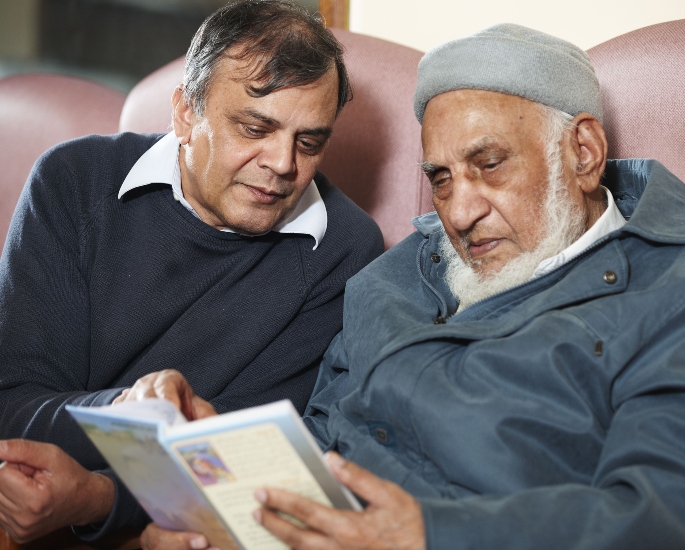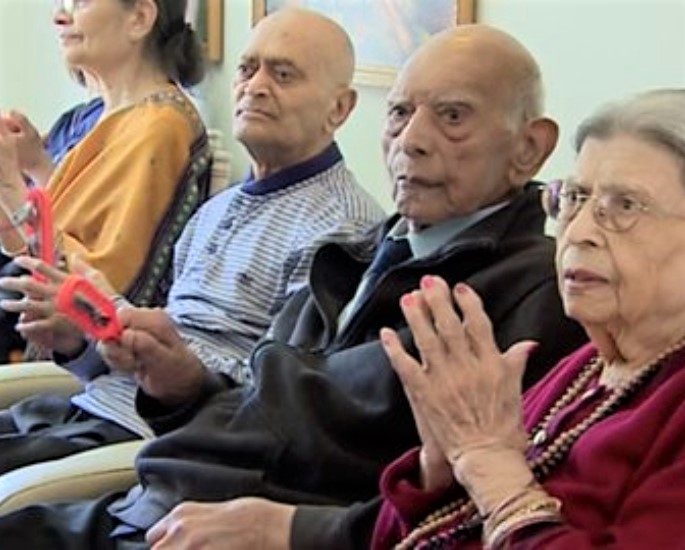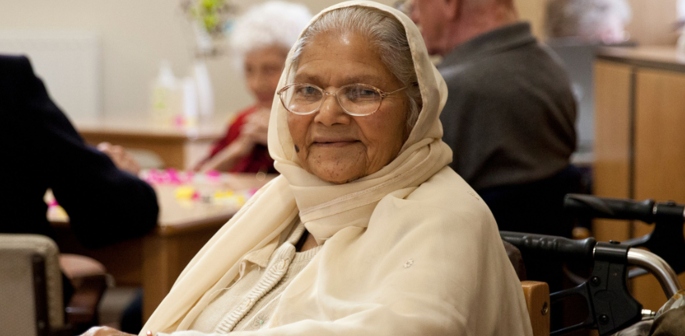"At my brother's, she was treated as an outsider."
In Desi homes, the importance of family, care and togetherness remains strong. It is no secret that care homes have been a taboo topic across many South Asian communities.
Desi attitudes position caring as natural, a duty to be fulfilled and an important continuation of family relationships.
Thus, the elderly being cared for within the family is something that South Asians have taken great pride in for generations.
Accordingly, in modern British Desi communities, there remains a strong expectation that the elderly will be cared for by family members.
This is emphasised by the continuous disgust at the idea of sending parents to care homes.
Simran Jha* a 33-year-old Indian teacher from Birmingham firmly believes in care occurring at home:
“I know there has been a seismic shift in Indian communities, I know two people who have moved very elderly and sick parents into care homes.
“But for me, my family and the community I’m a part of, it’s repugnant. We take pride in taking care of our loved ones when they need it.
“Yes it’s harder than it was in the past due to lifestyles, but we can’t selfishly think of ourselves.
“Our parents take care of us, for so long, it’s an honour to take care of them unless it’s truly impossible. If it’s truly impossible, you get carers to come to the house.”
The dominant narrative across Desi communities is care homes are taboo and caring for the family is an ‘honour’. This is compellingly highlighted in Simran’s words.
Yet contemporary challenges and responsibilities have changed the dynamics of the home and caring.
This shift is also a result of the UK elderly population continuing to rise. In 2019, 18.5% of the UK’s total population was aged 65 and over.
Moreover, between 2009-2019, the number of over-65s increased by 22.9% to 12.4 million. Thus, “demonstrating the highest level of growth of any broad age group.”
In addition to looking at Desi attitudes towards care homes, DESIblitz investigates whether or not South Asian parents should be in care homes.
Caring & The Reinforcement of Gender Inequality

Within Desi households, traditional values position caring for the elderly as the duty of sons.
The expectation is that parents will be cared for within their married son’s home. Or the eldest son will remain with his parents in adulthood.
Such expectations reinforce gender inequality and force daughters into a corner, as male siblings have ultimate authority and power socio-culturally.
Desi women are challenging such values. However, as 34-year-old Pakistani Iram Jabeen* shows, such hurdles bring tensions:
“When my ammi (mother) broke her hip, she initially moved in with my brother’s family. But it didn’t go well; she was lonely and struggling.
“I found myself furious, but ammi was like ‘it’s expected, things may get better’.”
Simmering with frustration, Iram continued:
“But things didn’t get better. My brother, even when home, expected his wife to do everything, and she wasn’t happy about that.
“Everyone huffed and puffed when I said ammi had agreed to move in with my husband and me. But it was the best thing.
“She’s back to smiling and laughing. People have said she should be in my brother’s house, but my husband and I are better positioned to care for her.
“Honestly, we don’t see it as a burdensome duty and enjoy having her with us.
“At my brother’s, she was treated as an outsider.”
Although longstanding values put caring as the sons’ duty, care work itself (formal and informal) remains highly gendered.
As seen from Iram’s words, the expectation was that her sister-in-law would undertake her mother’s daily care.
Indeed, no one expected Iram’s brother to cook and clean for their mother. Such expectations run through many Desi families and communities and cause rifts.
For Iram, the above events have led to long term fractures in her relationship with her brother. She feels such fractures will not ever be wholly healed.
Although more Desi’s are confronting these outdated expectations, it shows how important unity is within South Asian culture.
Ultimately, if the ethics of caring are questioned within the household, one can imagine how care homes could cause further unrest.
Family Bonds & Parental Expectations

Desi communities are more collectivist than individualistic. Thus, the emphasis is often on how decisions affect the whole family rather than the individual.
As is the case in most communities, elders are respected.
Their voices and thoughts are honoured but decisions around elderly South Asian parents moving to a care home brings strain.
Strains that, for some, show an imbalance in respect and authority and deviate from tradition.
This is reflected by 66-year-old Maya Jha*, a Sikh woman based in Birmingham:
“I don’t know where we went wrong. A couple of years ago, both my husband and I were in ill health. It was terrible.
“We believed all three of our children would be happy to help care for us. It wouldn’t be forever, and they’re family.
“The shock was that both my oldest son and daughter suggested we move into an old people’s home.”
“Only our youngest was against it.”
Maya’s words are laced with hurt and bafflement as she recalled what happened:
“They wanted us to sell our house. Use some of the money for care home fees and give them the rest – their expected inheritance.”
“They all knew we had worked hard to have our own home and wanted to die there. But only our youngest daughter respected our wishes.
“She and our granddaughter took turns staying with us. She hired a day nurse for when she was at work.”
For Maya, the suggestion made by her oldest two children was a betrayal that still stings her. Hesitantly, Maya still talks to them but “no longer trust(s) them.”
Both Maya and her husband drew up a will to ensure they would not have to fear their wishes being ignored.
Maya’s feelings and thoughts illustrate that the issue of care within the family remains a sensitive subject. One that can fracture families and bring into question interpersonal bonds and values.
There have been shifts in societal and individual attitudes towards caring for elder parents. As well as changes in perceptions of how elder care should be done.
For some, moving into a care home is a form of care and not abandonment. Although, not every person in the family will have the same view.
Moving into a Care Home: Who Decides?

When it comes to South Asian parents being in care homes, who makes the decision? Is it the elderly parents, adult children or wider circumstances?
Ambreen Akhtar* a 28-year-old stay at home mum in Birmingham states:
“Just before Covid-19 hit my mum injured herself badly, and someone did suggest that she go into a care home.
“But my mum really didn’t want to and we respected her wishes. We were able to look after her between us.
“My brothers and I have talked about it and we are so glad she made that choice. Especially with Covid, and the restrictions, her not being able to see us would have made her sicker.
“If she had insisted on being in a care home, we would have done what she wanted. But she may have not made it out, and that thought is terrifying.”
There are also instances where gender inequality, in terms of who undertakes care work, can be an issue. Ava Bibi* a community worker in Birmingham recalled:
“I know an elderly couple whose grandson had to move them into a care home. He did it because his wife wouldn’t take care of them. So, he had no choice.”
The gendered and traditional expectation that the wife would undertake the daily care of her husband’s grandparents is problematic.
However, the idea of women as natural carers is entrenched in British Desi communities and more broadly.
In turn, there are times when people are between a rock and a hard place, with no real choice.
For example, a care home may be the only option due to having no family or critical care needs. On the other hand, it may not be an option due to financial constraints.
Adam Khalid*, a 30-year-old British Bangladeshi and Indian expresses:
“In London, there are more tailored homes for the Asian elderly which is great. But not everyone can afford it.
“We were lucky. Although we weren’t eligible for the full NHS coverage, we were eligible for the NHS to pay a part of our mum staying in a home.”
Adam goes on to reveal:
“Due to our mum’s health and needs it was the best option, and she wanted to. She’s made many friends and is always smiling.
“But the only reason she is able to be in the care home is because me and my siblings are sharing the financial responsibility. If it was only me, it would be impossible.”
This illustrates the complexity of this matter and showcases how the choices made by individuals and families can be constrained.
Choices do not exist in a bubble, they are not protected from wider structural influences.
Modern lifestyles, financial constraints and work responsibilities can be a barrier to providing care within the family.
Care Homes: A Place for Friendship & Belonging?

With a variety of people of similar ages living in care homes, they could be places of friendship and belonging.
In an era where loneliness is becoming a key social issue, places of belonging and friendship matter. Age UK states that:
“1.4 million older people in the UK are often lonely. Loneliness is a major issue that is now widely recognised in society today.”
Whilst the Desi elderly are more likely to live with family than white elderly individuals, that does not mean they do not experience loneliness.
Research conducted in 2012 by Victor et al, showed that loneliness occurs within British Asian and other minority communities.
They identified “very high rates of reported loneliness”. Ranging from 24% to 50% amongst those elders originating from countries such as Pakistan and Bangladesh.
Whilst those originating from India were in the region of 8-10% for Britain. This data shows that levels of solitude are significant within British Desi communities.
Yet not enough research or focus is given to the loneliness of elderly South Asian people. Nor is enough attention given to how it can be addressed.
Culturally Sensitive Care Homes
Today there are care homes like Aashna House in London providing culturally sensitive care to elderly South Asians. Everyone employed at Aashna House comes from a South Asian background.
The Guardian reporter Sarfraz Manzoor visited Aashna House in 2011 and spoke to the residents, many of whom were content and showed happiness.
Nevertheless, Sarfraz also spoke to resident Egbert Sen, a 78-year-old Christian Pakistani.
Sen is a retired actor who stated he had five children. He appeared as an extra in a range of films, including Octopussy (1983), My Beautiful Laundrette (1985) and Raiders of the Lost Ark (1981).
However, Sen was unhappy and felt out of place:
“I have no friends here so I am not happy. The Gujaratis keep themselves to themselves, the Patels do the same. I wish there were more Pakistanis here.”
Being with others who have commonalities with a person is important, as illustrated by Sen.
Moreover, Fareeda*, who is from Lahore and has worked as a full-time care officer at Aashna for the past seven years states:
“There are not too many Pakistanis because their children have been brought up with different values – their children would be too ashamed to put their parents in a care home.
“The people here like the fact that we speak their language and cook their kind of food.”
Food and shared language are important mediums through which people can feel a sense of belonging and connection.
Fareeda’s account highlights the differences within South Asian cultures/groups on the taboo nature of care homes.
Thus care homes need to recognise South Asian communities are not uniform, rather there are subtle differences that matter.
Many residents at Aashna House were Indian Gujaratis so is it possible that Sen would be more content in a home with more people from his culture?
The key could be to have more culturally sensitive/tailored care homes for South Asian communities, in order for them to be more accepted.
Distrust of Care Homes
 When it comes to using formal services to care for elderly South Asian parents, there can be a number of barriers.
When it comes to using formal services to care for elderly South Asian parents, there can be a number of barriers.
For example, norms, cultural stigma, fear, and distrust. All these can prohibit Desi’s from seeing care homes as viable avenues of support and care.
Jaya Hussain* a 25-year-old British Pakistani housing advisor showed extreme unease at the idea of sending parents to a care home:
“We (aka Asians) don’t trust care homes. Negative news reports on the bad things that happen in care homes stick with you.
“You don’t know the people caring for your family members.
“We also have a culture where you look after parents and siblings.”
Jaya has noticed a rise in Asian people moving to care homes in Birmingham. She finds such an increase, worrying.
Also, Jaya’s words reflect how negative news stories become entrenched in your mind.
Such reports can leave a strong sense of unease for those who hear them. An apprehension that can become deeply embedded and hard to shake off.
Similarly, Samantha Kapoor*, a 33-year-old Leeds-based Indian office worker, is repulsed by the idea of care homes:
“There may be instances where people don’t have a chance. But the idea of sending my parents to a care home, or my kids doing it to me, makes my skin crawl.
“The stories you hear of neglect and abusive staff sounds horrifying. It doesn’t happen everywhere, but it happens.”
Abuse of the elderly in care homes does sometimes happen. This type of misconduct often referred to as ‘elder abuse’, is deemed a “global public health problem”.
Yet, the experience of residing in a care home does not have to be negative.
Manibhen Ramjee, 85 and her son Dinesh, a 57-year-old retired headteacher, spoke to The Guardian in 2011. Both detailed how they felt about the care home Manibhen resides in and why she is there.
Manibhen’s children visit regularly, and when asked what she thinks of the home, she said it was excellent.
Also, Ava Singh* a 68-year-old based in a London care home, feels care homes can be fun places of growth:
“I have always been a bit of an introvert and was very nervous when I first decided to move in. But I didn’t want to go to Canada with my daughter; England is my home.
“Today I am very happy. I am more confident in speaking to people and there is always something fun to do.
“Covid-19 was frightening but I was with friends and none passed due to the virus.”
There is a need to alter perceptions of care homes within Desi communities. In addition, more information needs to be shared about the nuanced support available.
Wellbeing & Care Outside the Home

In the west, retaining a sense of purpose is key to helping people age well.
Consequently, people are encouraged to seek interactions and activities outside their homes and families.
Although, this is not something that has been widely embedded into British Asian communities.
Toslima Khanam*, a 44-year-old Bangladeshi based in Birmingham points out:
“It differs from family to family and community to community. But take my mum, she’s 70 and doesn’t have a social life outside the family circle.
“She goes out for grocery shopping and with family, that’s it.
“Even though I encourage her to do more outside, she still hears my dad’s voice.
“He preferred her home and with relatives. She’s set in her ways.”
These traditional norms and expectations are barriers that need to be broken. Moreover, talking to Toslima showed there are generational differences.
Toslima stressed that she would be “having fun and spending time” with her friends, even at 80-years-old.
Although, she recognised that for her mum, that was not a norm she grew up with or experienced over the years.
Day Centres for the Elderly
In addition, more focus needs to be put on day centres for the elderly and supporting them to get to such places.
Apna Ghar (meaning ‘our home’) provides daycare for the elderly, disabled and vulnerable in Birmingham. Predominately supporting those from South Asian backgrounds.
Sonia Khan*, a 34-year-old Pakistani hairdresser, recalls her maternal grandmother going to Apna Ghar:
“My nani used to go to Apna House and come back with a smile on her face. She loved it, the different activities and people.
“And the fact they spoke her language and could talk about back home, she loved it all.”
Day centres for the elderly can be places of friendship, laughter and activity that support mental health and wellbeing.
Governmental funding is needed to create more day centres for the elderly. Such facilities would be valuable in maintaining and fostering socialisation and activity.
However, these facilities would have to be culturally sensitive and engaging, which would be challenging to fund.
Challenging due to the climate of government cuts and emphasis on individual responsibility.
Addressing this problem will present the best of both worlds. Where the elders can go to a care home of joy during the day but still go back to their families in the evening.
This also allows the family unity to survive as it removes the permanent aspect of putting the elders into a care home.
The Future for Families & Care Homes

South Asian parents moving into care homes remains deeply abhorrent for many British Desi communities and families.
It goes against ideas of loyalty, responsibility, and the image of loving bonds between parents and children.
Yet, the demands of modern life mean that family members are often working outside the home.
Therefore, elderly parents are left alone in the house – isolated and excluded, even unintentionally.
Hence, care homes can become places of belonging, removing feelings of loneliness.
Moreover, care homes can be the best option for those suffering from serious health issues like dementia.
Imran Abid* a 31-year-old Indian Gujarati deliveryman, felt that whilst it’s not the norm, things are changing:
“It’s not something we do. My parents looked after both my nan and gran. It’s that old Asian heritage and culture.
“But things are changing. I know more and more Asians are going into care homes and independent living facilities.”
South Asian parents moving into care homes does not mean a lack of emotional bonds with children. Instead, it can be something that parents want.
Nevertheless, the darker side of care homes means wariness and unease is inevitable.
Therefore, more significant safeguarding needs to occur at a structural level.
Care homes also need to be culturally sensitive and aware of nuanced differences between different groups.
There needs to be greater awareness that the groups that constitute British South Asians have differences. Such differences need to be considered when attempting to make care homes feel like home for the Desi elderly.
However, in the capitalist society we live in, robust formal care increasingly costs more. Therefore, informal care will continue to dominate.
Within Desi homes, the family remain central to providing care and support for older South Asian parents and the elderly. This may continue due to costs and values.
Truth be told, there is beauty in reciprocating the care towards the older generation.
Younger people can learn about their heritage if caring for their elderly parents. It is also a way for family bonds to strengthen
Also, South Asian parents being in a care home is not necessarily a sign of a lack of family care. Rather a reflection of lifestyle changes.
Either way, a robust formal support infrastructure that is culturally sensitive is needed. In part, this is due to a growing ageing population.
The issue is an emotive one and will remain so. It creates tensions and results in clashes between modern lifestyles and traditional ideals and hopes.
Ideally, there needs to be the correct balance between South Asians and care homes. Where modern culture is taken into account whilst conventional Desi characteristics are maintained.






























































